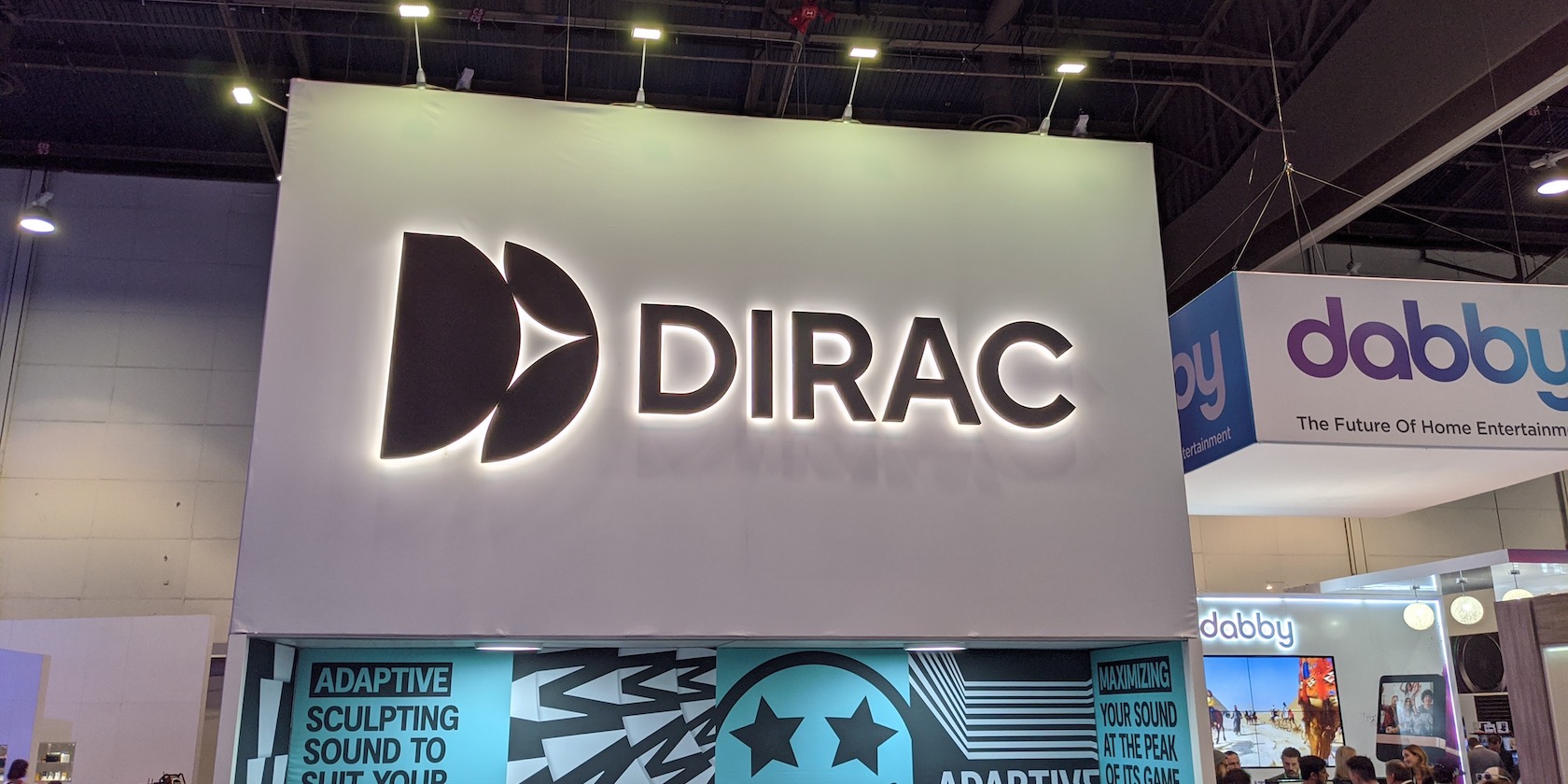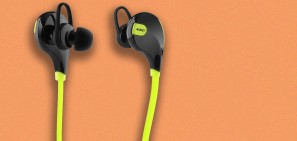
MakeUseOf covered CES yet again this year, and we saw a lot of cool stuff across the expo’s four days. And also a lot of not-so-impressive rubbish.
Here’s a rundown of our coolest findings, including mixed reality glasses, a headphone sound quality booster, and a massive yet sleek TV with close to zero bezel.
1. Nreal AR Glasses: Next-Gen Mixed Reality On-the-Go

Nreal’s AR glasses, called Nreal Light, opened plenty of eyes at CES 2020 to the practical real-world applications of mixed reality. It’s no longer theoretical or hypothetical—these AR glasses prove that mixed reality can truly augment day-to-day life in ways beyond mere gimmickry. I walked away impressed and excited.
Nreal’s CES 2020 exhibition showcased three separate demos that showed practical mixed reality in action: a set of AR games (including a wave-based zombie survival, Fruit Ninja-esque slasher, and Street Fighter-esque fighting game), a virtual shopping experience for apparel, and an augmented smart home setup involving interactions with real-world devices via Nreal’s AR glasses.
While the demos were rough around the edges with occasional bugs and crashes, and even though the glasses felt a bit bulky when worn, the overall exhibition was a triumph for Nreal in proving the viability of their approach to mixed reality.
Contributed by Joel Lee, read the full post:
2. Dirac Audio Boosting App: Professional Tuning to Make Any Headphones Sound Better

Dirac’s first appearance at CES is to mark its foray into a mass-market consumer product. Its upcoming app allows you to take any pair of headphones and instantly make them sound better with a simple tap on an app.
Chances are that no matter what headphones you have, they could sound better. Dirac’s engineers create custom profiles for major models of headphones so you get a more complete listening experience from your favorite music.
You might think that it’s the same as the equalizer that’s already on your phone, but those are difficult to use properly for non-audiophiles. Using Dirac’s app is like handing your headphones to an audio professional and getting a perfect mix tuned for them.
Whether you want to make low-end headphones sound better or squeeze every last bit of performance out of your high-end cans, we think Dirac’s app has a lot of potential to change the headphone game.
Contributed by Ben Stegner, read the full post:
3. Healium AR/VR: Immersive Stress and Anxiety Reduction

Traditional meditation doesn’t work for everyone. Healium recognizes that problem, and has reinvented meditation through its AR and VR apps. It’s the perfect gamified way for anyway to de-stress and relax.
When you use Healium’s VR app, you’ll need the Muse brain-sensing headband, along with Oculus Go VR goggles. Healium provides you with a range of VR environments that you can immerse yourself in. Once you land in your new world, you’ll notice a chart of your brain activity.
Healium hopes that you recognize the power of your thoughts. The more positive your brain activity is, the more the environment around you will change. It’s a clever way to promote more positive and relaxed thinking that you can use in your daily life.
On the other hand, the Healium AR app utilizes your smartphone, Apple Watch, and Muse headband. This time, you’ll see AR elements that you can interact with from your phone’s screen.
Healium collects your heart rate from your Apple Watch and your brain activity from the headband. You can try lowering your heart rate to hatch AR butterflies, or use relaxed thinking to brighten the solar system.
For a company that began as a startup, Healium has already made some amazing impressions. Published scientific studies show that Healium can actually help reduce anxiety and improve your mood.
Contributed by Emma Roth, read the full post:
4. New Laptop Concepts by Dell, LG, and Lenovo

CES has a reputation for showcasing the weird, wacky, and wonderful. But how much of that “cool” stuff is ever going to make it to market? How much of it is really useful for end-users and regular consumers? In truth, very little.
That’s why the best products at CES 2020 were the laptops and desktops from the biggest players in the industry. LG, Dell, and Lenovo were all on hand to take the wraps off their new releases for the upcoming 12 months. Unlike some of the stranger devices at CES , these products do have release dates, do have a fixed price point, and are unquestionably useful for the consumers.
But which was the best new laptop at CES? It depends on your personal preference. For me, it’s hard to beat the sheer beauty of the Dell XPS 13. It’s sleek, powerful, lightweight, and packed with useful features. Business-minded folks might prefer the refreshed Lenovo ThinkPads though.
And lastly, a nod to some of Dell’s concept ideas. Provisionally called Duet and Ori, they boast seamless folding screens, dual screens, and touch/e-ink inputs. A sign of the future, no doubt.
Contributed by Dan Price, read the full post:
5. Creative SXFI GAMER: 3D Sound for Pro Gamers

Last year, Creative wowed the press with its Super X-Fi Headphone Holographic technology. At CES 2020, they released Super X-Fi Gen2 and a new line of improved SXFI products, including the SXFI GAMER gaming headset.
Super X-Fi turns your headphones into a 3D surround sound experience. Creative offers a line of SXFI headphones that come with the technology built-in, as well as an AMP that adds the feature to any conventional headphones. Unlike Sony’s 360 Reality Audio, Super X-Fi does not require a special audio format.
The new Creative SXFI GAMER headphones will bring 3D sound to gaming. The built-in sound profile was specifically designed for first-person shooter games and is driven by Super X-Fi Gen2, which preserves more audio details, more accurately represents the direction of sound, and provides higher audio fidelity. The gaming headset includes a high-end, yet replaceable gaming microphone with an integrated pop filter.
The SXFI GAMER will launch in Q2 of 2020, and we estimate that it will retail between $ 200 and $ 250.
Contributed by Tina Sieber, read the full post:
6. Cherry Viola: Solder-Free Mechanical Keyboard Switch

At the end of CES 2020, Cherry Keyboards—a manufacturer of mechanical switches and keyboards—announced a new mechanical keyboard switch which dramatically reduces the cost of keyboards and switch manufacturing. On top of making keyboards less expensive, the Viola’s box-shaped stem allows for rattle-free keys, faster rebound and reaction time for gamers, and (above all else) solder-free construction which makes keyboards far less expensive manufacture and easy to upgrade.
The impact of Cherry Viola switches on the keyboard market remains to be seen, both in terms of reliability and cost. However, given Cherry’s outstanding reputation in the market, their long history, and the quality of their previous product, the Viola will likely come to replace the now venerable MX line of switch. (Cherry will continue to support its MX switch line as indicated by the new MX1A upgrades.)
On the downside, the Viola will require specialized printed-circuit boards, meaning older keyboards can’t be retrofitted with the new technology. Fortunately, your old key caps will continue to work with the Viola stems, which retain the X-shaped fitment pattern.
Cherry is already working with its manufacturing partners to release its first wave of Viola-equipped mechanical keyboards by the holiday season of 2020. My best guess is that the first full-sized Viola keyboard will become available by Black Friday of 2020 from Logitech and will cost around $ 60. Cherry’s estimate was that the first keyboards would be in the $ 50 range.
Contributed by Kannon Yamada, read the full post:
7. Samsung’s 8K TV: Beautiful, Sleek, Zero Bezel

I’m a sucker for a giant TV. Throw in the latest in high-resolution technology and a screen with almost no bezel, and you have a piece of tech that I could spend all day on the show floor drooling over.
Samsung’s Q950TS is literally the most beautiful TV I’ve ever seen, and while I probably won’t be able to afford one anytime soon, just knowing that such a sexy TV exists is enough to make me feel that all is right in the world of technology.
While you’re average television features around a 94-percent screen-to-bezel ratio, Samsung’s upcoming Q950TS features a staggering 99-percent ratio. That means that you can barely even tell that the TV has a bezel when sitting from a reasonable viewing distance. Imagine looking at your wall and seeing nothing but gorgeous 8K picture. It’s the television future we’ve all been waiting for, and it’s actually here.
Contributed by Dave LeClair, read the full post:
Read the full article: The 7 Coolest New Products at CES 2020



